外研版中考英语复习语法知识第九章句子种类及简单句课件
文档属性
| 名称 | 外研版中考英语复习语法知识第九章句子种类及简单句课件 |

|
|
| 格式 | ppt | ||
| 文件大小 | 1.9MB | ||
| 资源类型 | 试卷 | ||
| 版本资源 | 外研版 | ||
| 科目 | 英语 | ||
| 更新时间 | 2025-05-27 00:00:00 | ||
图片预览

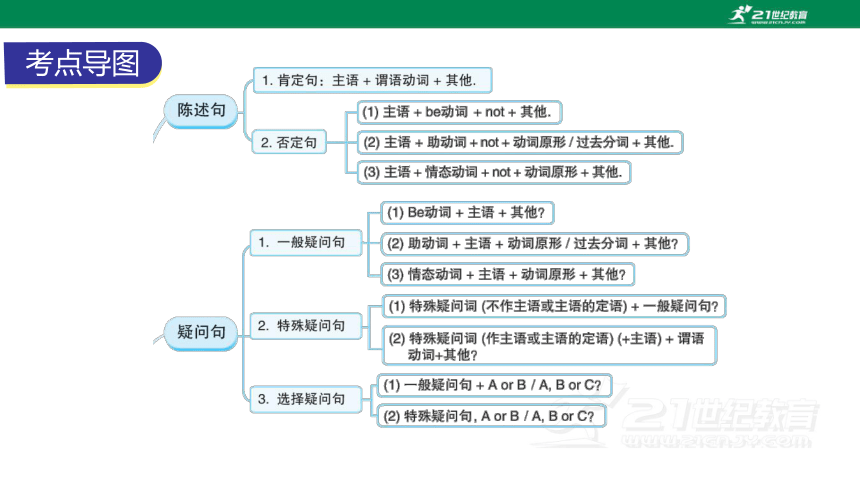

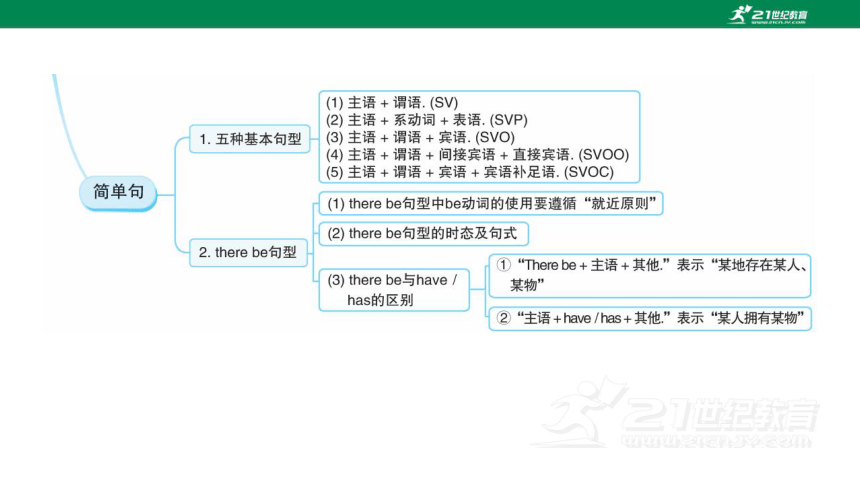



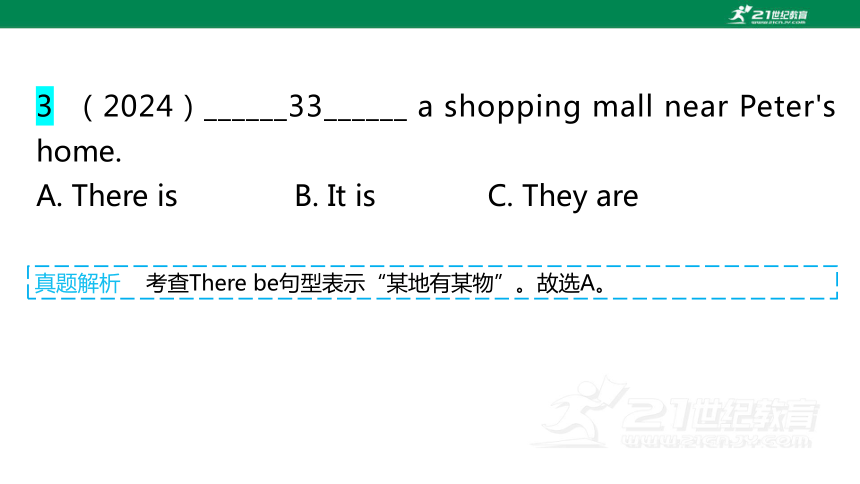

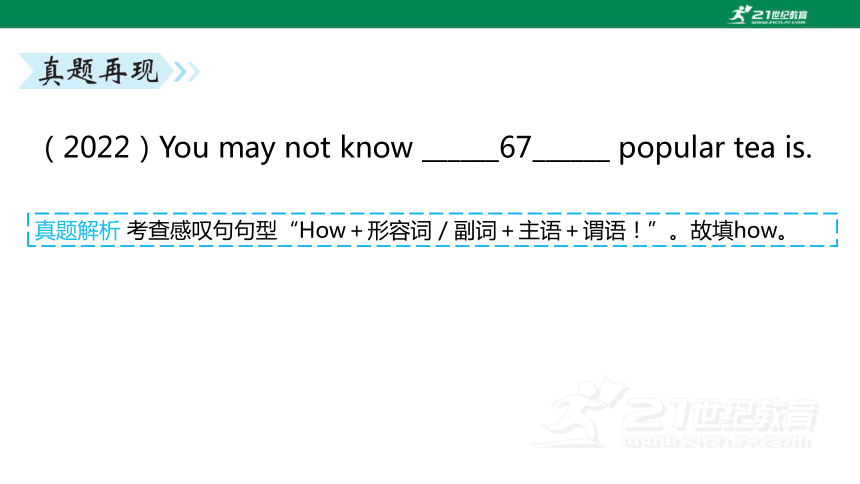
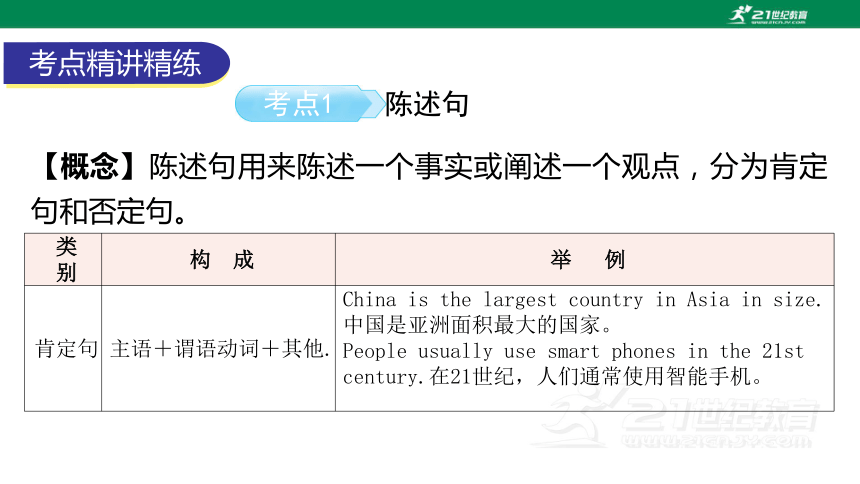
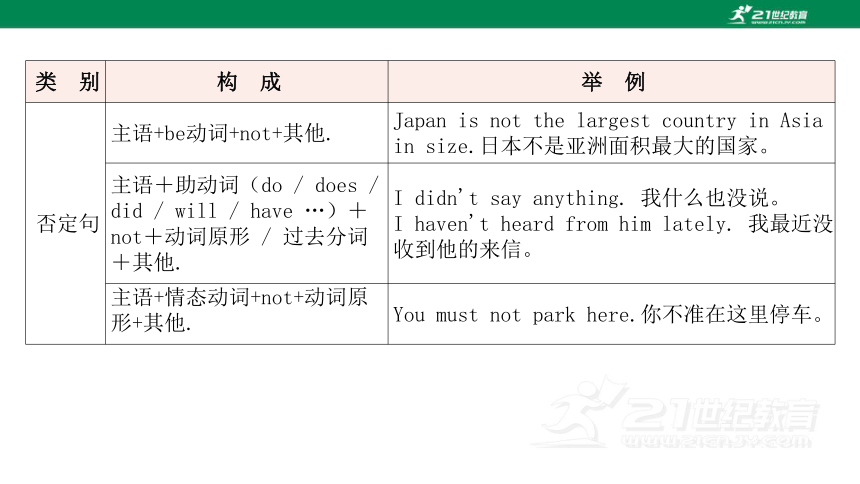
文档简介
(共55张PPT)
第九章 句子种类及简单句
考点导图
在近5年广东中考中,语法选择主要考查感叹句和简单句:(1)感叹句需根据句子结构判断是用how还是what引导,如(2020.39)(2023.35);(2)There be句型表示“某地有某物”,如(2024.33)。
真题解析 考查感叹句句型“How+形容词 / 副词+主语+谓语!”。故选D。
真题解析 考查感叹句句型“How+形容词 / 副词+主语+谓语!”。故选A。
真题解析 考查There be句型表示“某地有某物”。故选A。
在近5年广东中考中,短文填空主要考查感叹句,注意根据中心词的词性判断是用how还是what:名词使用what,形容词或副词使用how,如(2022.67)。
(2022)You may not know ______67______ popular tea is.
真题解析 考查感叹句句型“How+形容词 / 副词+主语+谓语!”。故填how。
考点精讲精练
【概念】陈述句用来陈述一个事实或阐述一个观点,分为肯定句和否定句。
考点1
陈述句
类 别 构 成 举 例
肯定句 主语+谓语动词+其他. China is the largest country in Asia in size.中国是亚洲面积最大的国家。
People usually use smart phones in the 21st century.在21世纪,人们通常使用智能手机。
类 别 构 成 举 例
否定句 主语+be动词+not+其他. Japan is not the largest country in Asia in size.日本不是亚洲面积最大的国家。
主语+助动词(do / does / did / will / have …)+not+动词原形 / 过去分词+其他. I didn't say anything. 我什么也没说。
I haven't heard from him lately. 我最近没收到他的来信。
主语+情态动词+not+动词原形+其他. You must not park here.你不准在这里停车。
【拓展】陈述句的其他否定形式
(1)对谓语动词的否定,除了not,还可以用never, hardly, seldom等。
例 He never smokes.他从不抽烟。
(2)对主语或宾语的否定,常用no, few, little, nothing, nobody等。
例 Few home buyers will notice this change. 很少购房者会注意到这个变化。
1. She visited her grandparents last Sunday.(改为否定句)
(2024重庆A卷)
She ____________ ____________ her grandparents last Sunday.
2. Kate likes eating vegetable salad.(改为否定句)
(2024重庆B卷)
Kate ____________ ____________ eating vegetable salad.
3. Tim is reading Journey to the West.(改为否定句)
(2023重庆A卷)
Tim ____________ ____________ Journey to the West.
didn't
visit
doesn't
like
isn't
reading
4. Tina finishes her homework before 6 o'clock every day.(改为否定句) (2023重庆B卷)
Tina ____________ ___________ her homework before 6 o'clock every day.
5. Cindy went to Shanghai last weekend.(改为否定句)
(2023甘肃白银)
Cindy ____________ ____________ to Shanghai last weekend.
doesn't
finish
didn't
go
【概念】疑问句主要用来提出问题、询问情况,分为一般疑问句、特殊疑问句、选择疑问句和反意疑问句(高考语法项目)。
1. 一般疑问句
【概念】一般疑问句是指用yes或no来回答的疑问句。
考点2
疑问句
构 成 举 例
Be动词+主语+其他 —Was he afraid of the dark?他以前怕黑吗?
—Yes, he was. / No, he wasn't. 是的,他怕。/ 不,他不怕。
助动词(Do / Does / Did / Will / Have …)+主语+动词原形 / 过去分词+其他? —Do you like English? 你喜欢英语吗?
—Yes, I do. / No, I don't. 是的,我喜欢。/ 不,我不喜欢。
情态动词+主语+动词原形+其他? —Can you play the piano 你会弹钢琴吗?
—Yes,I can./ No,I can't.是的,我会。/ 不,我不会。
2. 特殊疑问句
【概念】特殊疑问句是由特殊疑问词引导,对句中某一成分提问的疑问句,不能用yes或no回答。
构 成 举 例
特殊疑问词(不作主语或主语的定语)+一般疑问句? Why do the young seldom go out to the shops now 为什么年轻人现在很少去商店?
特殊疑问词(作主语或主语的定语)(+主语)+谓语动词+其他?(句子用陈述句的语序) Who can help me 谁能帮我?
Whose bike is broken 谁的自行车坏了?
【拓展】
(1)由疑问副词引导的特殊疑问句
疑问副词 意 义 用 法 举 例
when 什么时候 询问时间 —When did you last see him 你上次是什么时候见到他的?
—Last week.上周。
where 哪里 询问地点或位置 —Where do you live 你住在哪儿?
—I live in Guangzhou.我住在广州。
why 为什么 询问原因 —Why were you late 你为什么迟到?
—Because I missed the bus.因为我错过了公交车。
how 怎样;如何 询问感受、方式 —How do you go to school 你怎么去上学?
—By bike.骑自行车。
编者按 由疑问代词引导的特殊疑问句可见于“第四章 代词 考点4 疑问代词”。
(2)由how词组引导的特殊疑问句
词 组 意义及用法 回 答 举 例
how often 多久一次 (问频率) never / every day / twice a month等 —How often does an earthquake happen here 在这里,多久发生一次地震?
—Almost every year. 几乎每年都发生。
how long 多久 (问时间) for+一段时间 /
since+某个时间点 /
since+一段时间+ago —How long have you lived here?你在这里住多久了?
—For several months. 有几个月了。
多长 (问长度) 数词+长度单位 —How long is the Amazon River?亚马孙河有多长?
—About 6,440 kilometers. 约6 440千米。
how soon 多久之后 (问时间) in+一段时间 —How soon can you finish the work?你要多久才能完成这项工作?
—In half an hour. 半小时后。
词 组 意义及用法 回 答 举 例
how far 多远 (问距离) 数词+长度单位 —How far is it from Macao to Hong Kong?澳门距离香港多远?
—About 62 kilometers. 约62千米。
时间's+walk / ride / drive / flight等 —How far is it from Dongguan to Shenzhen?东莞距离深圳多远?
—About one hour's drive. 约1小时车程。
how many 多少 (问可数名词 的数量) 数词 —How many books can you see?你可以看到多少本书?
—Twelve. 12本。
how much 多少 (问不可数名 词的数量) 数词+量词(+of+名词) —How much water do you need?你需要多少水?
—Three cups of water.3杯水。
多少钱 (问价格) 数词+货币单位 —How much is this phone?这部手机多少钱?
—About 5,300 yuan. 约5 300元。
how old 多少岁 (问年龄) 数词[+year(s)old] —How old is your brother?你弟弟几岁?
—He is 5 years old. 他5岁了。
3. 选择疑问句
【概念】选择疑问句是指说话者提供两种或两种以上的选项,供对方选择其一的疑问句,不能用yes或no回答。
构 成 举 例
一般疑问句+A or B / A, B or C —Is the girl with short hair from America or England 那个短发女生是来自美国还是英国?
—She's from America.她来自美国。
特殊疑问句,A or B / A,B or C —Which do you prefer, cartoons or comedies 卡通片和喜剧,你更喜欢哪个?
—Neither. I like documentaries. 两个都不喜欢。我喜欢纪录片。
■(基础过关)单项填空
( )1. —_______ do you visit your grandparents
—Usually twice a month. (2024四川成都A卷)
A. How long B. How often C. How far
( )2. —_______ do many farmers put their products online these days
—To sell them more easily. (2024黑龙江绥化)
A. Why B. How C. When
B
A
( )3. —_______ was the zipper invented
—In 1893. (2024甘肃白银改编)
A.When B.How C.Why
( )4. —Can you cut tomatoes into thin pieces
—_______. Let me show you. (2024西藏改编)
A. Yes, I can B.No, I can't C. Yes, I do
( )5. —Do you like traveling by train or by plane
—_______. Because I love to see farms and animals along the way.
A. Yes, I do B. By plane C.By train
A
A
C
■(能力过关)选词组填空,有两词组为多余项
how far how old how long how soon how much how often how many
6. —Mike, ____________ do you play computer games
—Hardly ever. I think it is bad for my study.
(2024四川雅安改编)
7. —____________ is it from Changzhou to Beijing
—It is about four hours' ride by high-speed train.
(2024江苏常州改编)
how often
How far
8. —Lingling, ____________ will your brother come back from abroad
—Hmm, in a week. (2023辽宁营口改编)
9. —Good morning, madam! ________________ beef do you want
—Two kilos, please. (2023辽宁盘锦改编)
10. —______________ did you stay in Huangyuan during the Lantern Festival
—For six days. (2023青海改编)
how soon
how far how old how long how soon how much how often how many
How much
How long
考点3
祈使句
【概念】祈使句主要用来表示请求、命令、建议、禁止或祝愿等, 其主语you通常被省略, 谓语动词用原形。
类 别 构 成 举 例
Do型祈使句 肯定形式:动词原形+其他. 否定形式:Don't+动词原形+其他. Open the door, please.请打开门。
Don't talk in class.在课堂上别说话。
Be型祈使句 肯定形式:Be+表语! 否定形式:Don't +be+表语! Be careful!小心!
Be a good boy!做一个好孩子!
Don't be late for school!上学不要迟到!
Let型祈使句 肯定形式:Let+宾语+动词原形+其他. 否定形式:Let+宾语+not +动词原形+其他.=Don't let +宾语+动词原形+其他. Let me hear what people are looking forward to. 让我听听人们在期盼什么。
Let him not repeat such words.=Don't let him repeat such words.让他不要再重复这些话了。
No型祈使句 No+名词/动名词! No photos!禁止拍照!
No parking! 禁止停车!
■(基础过关)单项填空
( )1. “Li Ming, _______ your homework first, and you can watch TV for 30 minutes,” said his mom.
(2024黑龙江绥化)
A.does B. did C. do
( )2. _______ bird-watching in Qinglong Lake, and you will find it fun and meaningful.(2024四川成都A卷改编)
A. Go B. Going C. To go
C
A
( )3. _______ swim on your way home. It's really dangerous. (2023湖南湘西州)
A. Shouldn't B. Don't C. Doesn't
( )4. Hey, guy, can't you see the sign over there? It says,“_______ Fishing!”
A. No B. Not C. Don't
( )5. Let's____________ so loudly. The baby is sleeping.
A. not to talk B. talk not C. not talk
B
A
C
■(能力过关)选词填空,有两词为多余项
no not say do pass make turn
6. Please __________ the television off before you go to bed.
7. Hey, this sign says, “____________ smoking!” You are not allowed to smoke here.
8. Let us ____________ waste the wonderful time!
9. You can't drive through the forest. Look at the sign. It says, “No ____________ here!”
10. ____________ sure everyone has a textbook when the new term starts.
turn
No
not
passing
Make
考点4
感叹句
【概念】感叹句通常用来表达赞美、惊讶、喜悦或气愤等强烈的感情,句末常用“!”。
感叹词 构 成 举 例
how ①How+形容词/副词(+主语+谓语+ 其他)!(5年3考) How nice the weather is today!今天天气真好!
②How+主语+谓语(+其他)! How I missed you!我多么想念你啊!
③How+形容词+a / an+单数可数名词(+主语+谓语+其他)! How hard-working a boy he is!多么努力的男孩啊!
what ④What+a / an+形容词+单数可数名词(+主语+谓语+其他)! What a warm-hearted girl she is!多么热心肠的女孩啊!
⑤What+形容词+复数可数名词 / 不可数名词(+主语+谓语+其他)! What beautiful clothes they are!这些衣服真漂亮!
What nice weather it is today!今天天气真好!
【注意】③和④两种句式可以互相转换。
例 How good a day (we've had today)!=What a good day (we've had today)!(我们今天度过了)多么美好的一天啊!
■(基础过关)单项填空
( )1. —Li Lei won the first place. _______ good news it is!
—Yes, we're all happy for him. (2024黑龙江龙东地区)
A.How B.What a C.What
( )2. _______ helpful the speech is! It tells us to use the Internet safely. (2024吉林长春改编)
A. What B. What a C.How
C
C
( )3. —It was sunny several minutes ago, but it's raining heavily now!
—____________ difference a day makes! (2024黑龙江绥化)
A. What B.What a C.How
( )4. —____________ amazing magic show I saw yesterday! (2024西藏改编)
A.How B. What an C.What a
( )5. _______ amazing it is! The Shenzhou-18 members raise fish for the first time in Tiangong space station. (2024四川乐山)
A. What B.How C.What an
B
B
B
■(能力过关)选词填空,有两词为多余项
6. —____________ fine weather! It's a good match for going on a picnic.
—Exactly. I simply can't wait! (2024江苏宿迁改编)
7. —What ____________ wonderful experience our family had in the Mogao Caves!
—I'm glad you had a good time. (2024甘肃临夏州改编)
What
a
excite what bad who a how an
8. —Hi, guys! Our team won the first place in the table tennis match.
—What ____________ news it is! We are so happy about it.
(2024四川遂宁改编)
9. —The pen can translate what you write down into English.
—What _________ interesting invention!(2023辽宁鞍山改编)
10. ____________ strong our country is! I'm so proud of her.
(2023西藏改编)
exciting
excite what bad who a how an
an
How
考点5
简单句
1. 简单句的五种基本句型。
构 成 举 例
主语+谓语. (SV) (谓语为不及物动词) The accident happened.事故发生了。 S V
主语+系动词+表语. (SVP) Our classroom looks big.我们的教室看起来很大。 S V P
主语+谓语+宾语. (SVO) (谓语为及物动词) The boy likes tennis.这个男孩喜欢网球。 S V O
主语+谓语+间接宾语+直接宾语.(SVO0) (谓语为及物动词) Harry's friend passes him the ball.哈利的朋友把球传给他。 S V O O
主语+谓语+宾语+宾语补足语 . (SVOC) (谓语为及物动词) Technology makes our life better.科技让我们的生活更美好。 S V 0 C
2. there be 句型(2024.33)
(1) 遵循“就近原则”:there be 句型中的be动词应与其后最近的主语在数上保持一致。
例 There is a notebook and two pens on my desk. 我的书桌上有一本笔记本和两支钢笔。
(2) there be句型的时态及句式
类 别 一般现在时 一般过去时 一般将来时
肯定句 There is/are … There was/were … There will be …
There is / are going to be …
否定句 There isn't/aren't … There wasn't/weren't … There won't be …
There isn't / aren't going to be …
一般疑 问句及 其回答 —Is/Are there …
—Yes, there is/are.
—No, there isn't/aren't. —Was/Were there …
—Yes, there was/were.
—No, there wasn't/weren't. —Will there be …
Is / Are there going to be …
—Yes, there will be.
Yes, there is / are going to be.
—No, there won't be.
No, there isn't / aren't going to be.
(3) there be与have/has的区别:
①“There be+主语+其他.”表示“某地存在某人、某物”。
例 There is more room in first class. 头等舱更宽敞。
②“主语+have/has+其他.”表示“某人拥有某物”。
例 You have beautiful eyes. 你有一双漂亮的眼睛。
【注意】表示“有某人正在做某事”,要用“There be+sb.+doing sth.(+其他).”。
例 There are several children swimming in the swimming pool. 有几个孩子正在游泳池里游泳。
( )1. —Which do you think is the safest car color Is it a bright color like red
—No, it's actually white! If you drive a white car, there _______ fewer accidents. (2024内蒙古包头改编)
A.is B.will be C.will have
B
( )2. There ____________ four key skills of xiangsheng—shuo, xue, dou and chang. (2024贵州改编)
A.is B.are C.have
( )3. There _______ twenty-four solar terms (节气) in a year. Lichun is the first one. (2024黑龙江牡丹江改编)
A.have B.is C.are
B
C
( )4. There _______ a Miao Drum Culture Festival (苗鼓文化节) in the southwest of China next weekend.
(2023湖南湘西州)
A.is B. will have C. will be
( )5. There _______ a clear lake in my city.
(2023西藏改编)
A.are B.was C.is
C
C
语篇考点专练
C
A
B
Nala is from a loving home, but she seldom stays at home. She loves playing outside. Every day before she leaves the house, Nala's owner will tell her, “Please ___4____ on the train!”
___5____ can you find Nala At Stevenage Train Station!
( )4. A.get B.not get C.don't get
( )5. A.Why B.Where C.When
C
B
A
C
Day after day, the rose never stopped being unfriendly to the cactus. However, the cactus never got sad ___3____ angry, and he replied calmly every time, “Every life has a purpose to be what it is. Just ___4____ yourself.”
( )3.A.so B.but C.or
( )4.A.be B.being C.to be
C
A
As summer came, it was hot and dry. The rose lost a lot of water and ___5____ weaker and weaker, but the cactus grew well. He had strong roots (根) system and was good at storing water in ___6____ body.
( )5.A.become B.became C.becomes
( )6.A.his B.him C.he
B
A
One day, the rose saw a bird make ___7____ small hole in the cactus. The thirsty bird drank the water inside the cactus through the hole.
“It must hurt. ___8____ do you let the bird do so ” asked the rose.
( )7.A.a B.an C.the
( )8.A.When B.Where C.Why
A
C
“Because I don't want to see my bird friend suffer (受苦),” the cactus replied.The rose was so thirsty that she also asked the cactus ___9____ water. The cactus kindly agreed. He asked the bird ___10____ the water to the rose's roots.
The rose was ashamed (羞愧的) of what she had said to the cactus in the past. From then on, she stopped judging (评判) others by their looks. (2024四川乐山改编)
( )9.A.for B.with C.from
( )10.A.carry B.carrying C.to carry
A
C
Goran is a young man from Sweden. He is ___1____ at running and it is his favorite sport. He has been to many different competitions around the world for many years. If you show interest ___2____ running and want to have a try, here are some important things Goran would like you to know.
run enjoy in he how what why be do good time hardly
good
in
Don't ___3____ every day. In Goran's opinion, running every day is bad for beginners. If you are a green hand (新手) at the sport, running every day brings high stress to your body.
Don't run for too long at a time. You need to first give your body ___4____ to get strong. According to Goran, running for just 10 to 20 minutes in the beginning ___5____ OK. People who run too much at the beginning can ___6____ keep doing it for a long time.
run enjoy in he how what why be do good time hardly
run
time
is
hardly
Goran talks about these in one of his videos. He likes to make videos and use them to share his love for running. He says ___7____ favorite sport improves his health and makes him feel better. And he also ___8____ watching the beautiful views while he is running. ___9____ relaxing running is! If you want to know more about him and running, ___10____ not go online and watch some of his videos You will find the happiness of running.
run enjoy in he how what why be do good time hardly
his
enjoys
How
why
1. ____________ 2. ____________
3. ____________ 4. ____________
5. ____________ 6. ____________
7. ____________ 8. ____________
9. ____________ 10. ____________
good
in
run
time
is
hardly
his
enjoys
How
why
第九章 句子种类及简单句
考点导图
在近5年广东中考中,语法选择主要考查感叹句和简单句:(1)感叹句需根据句子结构判断是用how还是what引导,如(2020.39)(2023.35);(2)There be句型表示“某地有某物”,如(2024.33)。
真题解析 考查感叹句句型“How+形容词 / 副词+主语+谓语!”。故选D。
真题解析 考查感叹句句型“How+形容词 / 副词+主语+谓语!”。故选A。
真题解析 考查There be句型表示“某地有某物”。故选A。
在近5年广东中考中,短文填空主要考查感叹句,注意根据中心词的词性判断是用how还是what:名词使用what,形容词或副词使用how,如(2022.67)。
(2022)You may not know ______67______ popular tea is.
真题解析 考查感叹句句型“How+形容词 / 副词+主语+谓语!”。故填how。
考点精讲精练
【概念】陈述句用来陈述一个事实或阐述一个观点,分为肯定句和否定句。
考点1
陈述句
类 别 构 成 举 例
肯定句 主语+谓语动词+其他. China is the largest country in Asia in size.中国是亚洲面积最大的国家。
People usually use smart phones in the 21st century.在21世纪,人们通常使用智能手机。
类 别 构 成 举 例
否定句 主语+be动词+not+其他. Japan is not the largest country in Asia in size.日本不是亚洲面积最大的国家。
主语+助动词(do / does / did / will / have …)+not+动词原形 / 过去分词+其他. I didn't say anything. 我什么也没说。
I haven't heard from him lately. 我最近没收到他的来信。
主语+情态动词+not+动词原形+其他. You must not park here.你不准在这里停车。
【拓展】陈述句的其他否定形式
(1)对谓语动词的否定,除了not,还可以用never, hardly, seldom等。
例 He never smokes.他从不抽烟。
(2)对主语或宾语的否定,常用no, few, little, nothing, nobody等。
例 Few home buyers will notice this change. 很少购房者会注意到这个变化。
1. She visited her grandparents last Sunday.(改为否定句)
(2024重庆A卷)
She ____________ ____________ her grandparents last Sunday.
2. Kate likes eating vegetable salad.(改为否定句)
(2024重庆B卷)
Kate ____________ ____________ eating vegetable salad.
3. Tim is reading Journey to the West.(改为否定句)
(2023重庆A卷)
Tim ____________ ____________ Journey to the West.
didn't
visit
doesn't
like
isn't
reading
4. Tina finishes her homework before 6 o'clock every day.(改为否定句) (2023重庆B卷)
Tina ____________ ___________ her homework before 6 o'clock every day.
5. Cindy went to Shanghai last weekend.(改为否定句)
(2023甘肃白银)
Cindy ____________ ____________ to Shanghai last weekend.
doesn't
finish
didn't
go
【概念】疑问句主要用来提出问题、询问情况,分为一般疑问句、特殊疑问句、选择疑问句和反意疑问句(高考语法项目)。
1. 一般疑问句
【概念】一般疑问句是指用yes或no来回答的疑问句。
考点2
疑问句
构 成 举 例
Be动词+主语+其他 —Was he afraid of the dark?他以前怕黑吗?
—Yes, he was. / No, he wasn't. 是的,他怕。/ 不,他不怕。
助动词(Do / Does / Did / Will / Have …)+主语+动词原形 / 过去分词+其他? —Do you like English? 你喜欢英语吗?
—Yes, I do. / No, I don't. 是的,我喜欢。/ 不,我不喜欢。
情态动词+主语+动词原形+其他? —Can you play the piano 你会弹钢琴吗?
—Yes,I can./ No,I can't.是的,我会。/ 不,我不会。
2. 特殊疑问句
【概念】特殊疑问句是由特殊疑问词引导,对句中某一成分提问的疑问句,不能用yes或no回答。
构 成 举 例
特殊疑问词(不作主语或主语的定语)+一般疑问句? Why do the young seldom go out to the shops now 为什么年轻人现在很少去商店?
特殊疑问词(作主语或主语的定语)(+主语)+谓语动词+其他?(句子用陈述句的语序) Who can help me 谁能帮我?
Whose bike is broken 谁的自行车坏了?
【拓展】
(1)由疑问副词引导的特殊疑问句
疑问副词 意 义 用 法 举 例
when 什么时候 询问时间 —When did you last see him 你上次是什么时候见到他的?
—Last week.上周。
where 哪里 询问地点或位置 —Where do you live 你住在哪儿?
—I live in Guangzhou.我住在广州。
why 为什么 询问原因 —Why were you late 你为什么迟到?
—Because I missed the bus.因为我错过了公交车。
how 怎样;如何 询问感受、方式 —How do you go to school 你怎么去上学?
—By bike.骑自行车。
编者按 由疑问代词引导的特殊疑问句可见于“第四章 代词 考点4 疑问代词”。
(2)由how词组引导的特殊疑问句
词 组 意义及用法 回 答 举 例
how often 多久一次 (问频率) never / every day / twice a month等 —How often does an earthquake happen here 在这里,多久发生一次地震?
—Almost every year. 几乎每年都发生。
how long 多久 (问时间) for+一段时间 /
since+某个时间点 /
since+一段时间+ago —How long have you lived here?你在这里住多久了?
—For several months. 有几个月了。
多长 (问长度) 数词+长度单位 —How long is the Amazon River?亚马孙河有多长?
—About 6,440 kilometers. 约6 440千米。
how soon 多久之后 (问时间) in+一段时间 —How soon can you finish the work?你要多久才能完成这项工作?
—In half an hour. 半小时后。
词 组 意义及用法 回 答 举 例
how far 多远 (问距离) 数词+长度单位 —How far is it from Macao to Hong Kong?澳门距离香港多远?
—About 62 kilometers. 约62千米。
时间's+walk / ride / drive / flight等 —How far is it from Dongguan to Shenzhen?东莞距离深圳多远?
—About one hour's drive. 约1小时车程。
how many 多少 (问可数名词 的数量) 数词 —How many books can you see?你可以看到多少本书?
—Twelve. 12本。
how much 多少 (问不可数名 词的数量) 数词+量词(+of+名词) —How much water do you need?你需要多少水?
—Three cups of water.3杯水。
多少钱 (问价格) 数词+货币单位 —How much is this phone?这部手机多少钱?
—About 5,300 yuan. 约5 300元。
how old 多少岁 (问年龄) 数词[+year(s)old] —How old is your brother?你弟弟几岁?
—He is 5 years old. 他5岁了。
3. 选择疑问句
【概念】选择疑问句是指说话者提供两种或两种以上的选项,供对方选择其一的疑问句,不能用yes或no回答。
构 成 举 例
一般疑问句+A or B / A, B or C —Is the girl with short hair from America or England 那个短发女生是来自美国还是英国?
—She's from America.她来自美国。
特殊疑问句,A or B / A,B or C —Which do you prefer, cartoons or comedies 卡通片和喜剧,你更喜欢哪个?
—Neither. I like documentaries. 两个都不喜欢。我喜欢纪录片。
■(基础过关)单项填空
( )1. —_______ do you visit your grandparents
—Usually twice a month. (2024四川成都A卷)
A. How long B. How often C. How far
( )2. —_______ do many farmers put their products online these days
—To sell them more easily. (2024黑龙江绥化)
A. Why B. How C. When
B
A
( )3. —_______ was the zipper invented
—In 1893. (2024甘肃白银改编)
A.When B.How C.Why
( )4. —Can you cut tomatoes into thin pieces
—_______. Let me show you. (2024西藏改编)
A. Yes, I can B.No, I can't C. Yes, I do
( )5. —Do you like traveling by train or by plane
—_______. Because I love to see farms and animals along the way.
A. Yes, I do B. By plane C.By train
A
A
C
■(能力过关)选词组填空,有两词组为多余项
how far how old how long how soon how much how often how many
6. —Mike, ____________ do you play computer games
—Hardly ever. I think it is bad for my study.
(2024四川雅安改编)
7. —____________ is it from Changzhou to Beijing
—It is about four hours' ride by high-speed train.
(2024江苏常州改编)
how often
How far
8. —Lingling, ____________ will your brother come back from abroad
—Hmm, in a week. (2023辽宁营口改编)
9. —Good morning, madam! ________________ beef do you want
—Two kilos, please. (2023辽宁盘锦改编)
10. —______________ did you stay in Huangyuan during the Lantern Festival
—For six days. (2023青海改编)
how soon
how far how old how long how soon how much how often how many
How much
How long
考点3
祈使句
【概念】祈使句主要用来表示请求、命令、建议、禁止或祝愿等, 其主语you通常被省略, 谓语动词用原形。
类 别 构 成 举 例
Do型祈使句 肯定形式:动词原形+其他. 否定形式:Don't+动词原形+其他. Open the door, please.请打开门。
Don't talk in class.在课堂上别说话。
Be型祈使句 肯定形式:Be+表语! 否定形式:Don't +be+表语! Be careful!小心!
Be a good boy!做一个好孩子!
Don't be late for school!上学不要迟到!
Let型祈使句 肯定形式:Let+宾语+动词原形+其他. 否定形式:Let+宾语+not +动词原形+其他.=Don't let +宾语+动词原形+其他. Let me hear what people are looking forward to. 让我听听人们在期盼什么。
Let him not repeat such words.=Don't let him repeat such words.让他不要再重复这些话了。
No型祈使句 No+名词/动名词! No photos!禁止拍照!
No parking! 禁止停车!
■(基础过关)单项填空
( )1. “Li Ming, _______ your homework first, and you can watch TV for 30 minutes,” said his mom.
(2024黑龙江绥化)
A.does B. did C. do
( )2. _______ bird-watching in Qinglong Lake, and you will find it fun and meaningful.(2024四川成都A卷改编)
A. Go B. Going C. To go
C
A
( )3. _______ swim on your way home. It's really dangerous. (2023湖南湘西州)
A. Shouldn't B. Don't C. Doesn't
( )4. Hey, guy, can't you see the sign over there? It says,“_______ Fishing!”
A. No B. Not C. Don't
( )5. Let's____________ so loudly. The baby is sleeping.
A. not to talk B. talk not C. not talk
B
A
C
■(能力过关)选词填空,有两词为多余项
no not say do pass make turn
6. Please __________ the television off before you go to bed.
7. Hey, this sign says, “____________ smoking!” You are not allowed to smoke here.
8. Let us ____________ waste the wonderful time!
9. You can't drive through the forest. Look at the sign. It says, “No ____________ here!”
10. ____________ sure everyone has a textbook when the new term starts.
turn
No
not
passing
Make
考点4
感叹句
【概念】感叹句通常用来表达赞美、惊讶、喜悦或气愤等强烈的感情,句末常用“!”。
感叹词 构 成 举 例
how ①How+形容词/副词(+主语+谓语+ 其他)!(5年3考) How nice the weather is today!今天天气真好!
②How+主语+谓语(+其他)! How I missed you!我多么想念你啊!
③How+形容词+a / an+单数可数名词(+主语+谓语+其他)! How hard-working a boy he is!多么努力的男孩啊!
what ④What+a / an+形容词+单数可数名词(+主语+谓语+其他)! What a warm-hearted girl she is!多么热心肠的女孩啊!
⑤What+形容词+复数可数名词 / 不可数名词(+主语+谓语+其他)! What beautiful clothes they are!这些衣服真漂亮!
What nice weather it is today!今天天气真好!
【注意】③和④两种句式可以互相转换。
例 How good a day (we've had today)!=What a good day (we've had today)!(我们今天度过了)多么美好的一天啊!
■(基础过关)单项填空
( )1. —Li Lei won the first place. _______ good news it is!
—Yes, we're all happy for him. (2024黑龙江龙东地区)
A.How B.What a C.What
( )2. _______ helpful the speech is! It tells us to use the Internet safely. (2024吉林长春改编)
A. What B. What a C.How
C
C
( )3. —It was sunny several minutes ago, but it's raining heavily now!
—____________ difference a day makes! (2024黑龙江绥化)
A. What B.What a C.How
( )4. —____________ amazing magic show I saw yesterday! (2024西藏改编)
A.How B. What an C.What a
( )5. _______ amazing it is! The Shenzhou-18 members raise fish for the first time in Tiangong space station. (2024四川乐山)
A. What B.How C.What an
B
B
B
■(能力过关)选词填空,有两词为多余项
6. —____________ fine weather! It's a good match for going on a picnic.
—Exactly. I simply can't wait! (2024江苏宿迁改编)
7. —What ____________ wonderful experience our family had in the Mogao Caves!
—I'm glad you had a good time. (2024甘肃临夏州改编)
What
a
excite what bad who a how an
8. —Hi, guys! Our team won the first place in the table tennis match.
—What ____________ news it is! We are so happy about it.
(2024四川遂宁改编)
9. —The pen can translate what you write down into English.
—What _________ interesting invention!(2023辽宁鞍山改编)
10. ____________ strong our country is! I'm so proud of her.
(2023西藏改编)
exciting
excite what bad who a how an
an
How
考点5
简单句
1. 简单句的五种基本句型。
构 成 举 例
主语+谓语. (SV) (谓语为不及物动词) The accident happened.事故发生了。 S V
主语+系动词+表语. (SVP) Our classroom looks big.我们的教室看起来很大。 S V P
主语+谓语+宾语. (SVO) (谓语为及物动词) The boy likes tennis.这个男孩喜欢网球。 S V O
主语+谓语+间接宾语+直接宾语.(SVO0) (谓语为及物动词) Harry's friend passes him the ball.哈利的朋友把球传给他。 S V O O
主语+谓语+宾语+宾语补足语 . (SVOC) (谓语为及物动词) Technology makes our life better.科技让我们的生活更美好。 S V 0 C
2. there be 句型(2024.33)
(1) 遵循“就近原则”:there be 句型中的be动词应与其后最近的主语在数上保持一致。
例 There is a notebook and two pens on my desk. 我的书桌上有一本笔记本和两支钢笔。
(2) there be句型的时态及句式
类 别 一般现在时 一般过去时 一般将来时
肯定句 There is/are … There was/were … There will be …
There is / are going to be …
否定句 There isn't/aren't … There wasn't/weren't … There won't be …
There isn't / aren't going to be …
一般疑 问句及 其回答 —Is/Are there …
—Yes, there is/are.
—No, there isn't/aren't. —Was/Were there …
—Yes, there was/were.
—No, there wasn't/weren't. —Will there be …
Is / Are there going to be …
—Yes, there will be.
Yes, there is / are going to be.
—No, there won't be.
No, there isn't / aren't going to be.
(3) there be与have/has的区别:
①“There be+主语+其他.”表示“某地存在某人、某物”。
例 There is more room in first class. 头等舱更宽敞。
②“主语+have/has+其他.”表示“某人拥有某物”。
例 You have beautiful eyes. 你有一双漂亮的眼睛。
【注意】表示“有某人正在做某事”,要用“There be+sb.+doing sth.(+其他).”。
例 There are several children swimming in the swimming pool. 有几个孩子正在游泳池里游泳。
( )1. —Which do you think is the safest car color Is it a bright color like red
—No, it's actually white! If you drive a white car, there _______ fewer accidents. (2024内蒙古包头改编)
A.is B.will be C.will have
B
( )2. There ____________ four key skills of xiangsheng—shuo, xue, dou and chang. (2024贵州改编)
A.is B.are C.have
( )3. There _______ twenty-four solar terms (节气) in a year. Lichun is the first one. (2024黑龙江牡丹江改编)
A.have B.is C.are
B
C
( )4. There _______ a Miao Drum Culture Festival (苗鼓文化节) in the southwest of China next weekend.
(2023湖南湘西州)
A.is B. will have C. will be
( )5. There _______ a clear lake in my city.
(2023西藏改编)
A.are B.was C.is
C
C
语篇考点专练
C
A
B
Nala is from a loving home, but she seldom stays at home. She loves playing outside. Every day before she leaves the house, Nala's owner will tell her, “Please ___4____ on the train!”
___5____ can you find Nala At Stevenage Train Station!
( )4. A.get B.not get C.don't get
( )5. A.Why B.Where C.When
C
B
A
C
Day after day, the rose never stopped being unfriendly to the cactus. However, the cactus never got sad ___3____ angry, and he replied calmly every time, “Every life has a purpose to be what it is. Just ___4____ yourself.”
( )3.A.so B.but C.or
( )4.A.be B.being C.to be
C
A
As summer came, it was hot and dry. The rose lost a lot of water and ___5____ weaker and weaker, but the cactus grew well. He had strong roots (根) system and was good at storing water in ___6____ body.
( )5.A.become B.became C.becomes
( )6.A.his B.him C.he
B
A
One day, the rose saw a bird make ___7____ small hole in the cactus. The thirsty bird drank the water inside the cactus through the hole.
“It must hurt. ___8____ do you let the bird do so ” asked the rose.
( )7.A.a B.an C.the
( )8.A.When B.Where C.Why
A
C
“Because I don't want to see my bird friend suffer (受苦),” the cactus replied.The rose was so thirsty that she also asked the cactus ___9____ water. The cactus kindly agreed. He asked the bird ___10____ the water to the rose's roots.
The rose was ashamed (羞愧的) of what she had said to the cactus in the past. From then on, she stopped judging (评判) others by their looks. (2024四川乐山改编)
( )9.A.for B.with C.from
( )10.A.carry B.carrying C.to carry
A
C
Goran is a young man from Sweden. He is ___1____ at running and it is his favorite sport. He has been to many different competitions around the world for many years. If you show interest ___2____ running and want to have a try, here are some important things Goran would like you to know.
run enjoy in he how what why be do good time hardly
good
in
Don't ___3____ every day. In Goran's opinion, running every day is bad for beginners. If you are a green hand (新手) at the sport, running every day brings high stress to your body.
Don't run for too long at a time. You need to first give your body ___4____ to get strong. According to Goran, running for just 10 to 20 minutes in the beginning ___5____ OK. People who run too much at the beginning can ___6____ keep doing it for a long time.
run enjoy in he how what why be do good time hardly
run
time
is
hardly
Goran talks about these in one of his videos. He likes to make videos and use them to share his love for running. He says ___7____ favorite sport improves his health and makes him feel better. And he also ___8____ watching the beautiful views while he is running. ___9____ relaxing running is! If you want to know more about him and running, ___10____ not go online and watch some of his videos You will find the happiness of running.
run enjoy in he how what why be do good time hardly
his
enjoys
How
why
1. ____________ 2. ____________
3. ____________ 4. ____________
5. ____________ 6. ____________
7. ____________ 8. ____________
9. ____________ 10. ____________
good
in
run
time
is
hardly
his
enjoys
How
why
同课章节目录
- 词法
- 名词
- 动词和动词短语
- 动词语态
- 动词时态
- 助动词和情态动词
- 非谓语动词
- 冠词
- 代词
- 数词和量词
- 形容词副词及其比较等级
- 介词和介词短语
- 连词和感叹词
- 构词法
- 相似、相近词比较
- 句法
- 陈述句
- 一般疑问句和否定疑问句
- 特殊疑问句及选择疑问句
- 反意疑问句
- 存在句(There be句型)
- 宾语从句
- 定语从句
- 状语从句
- 主谓一致问题
- 简单句
- 并列句
- 复合句
- 主谓一致
- 主、表语从句
- 名词性从句
- 直接引语和间接引语
- 虚拟语气
- 感叹句
- 强调句
- 倒装句
- 祈使句
- 句子的成分
- 句子的分类
- 题型专区
- 单项选择部分
- 易错题
- 完形填空
- 阅读理解
- 词汇练习
- 听说训练
- 句型转换
- 补全对话
- 短文改错
- 翻译
- 书面表达
- 任务型阅读
- 语法填空
- 其他资料
